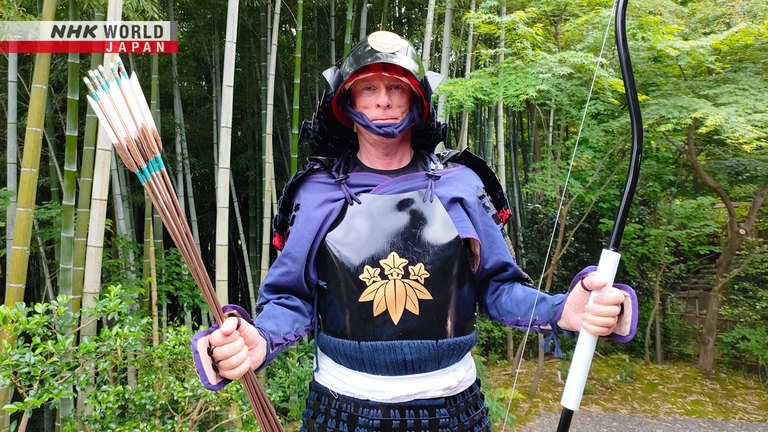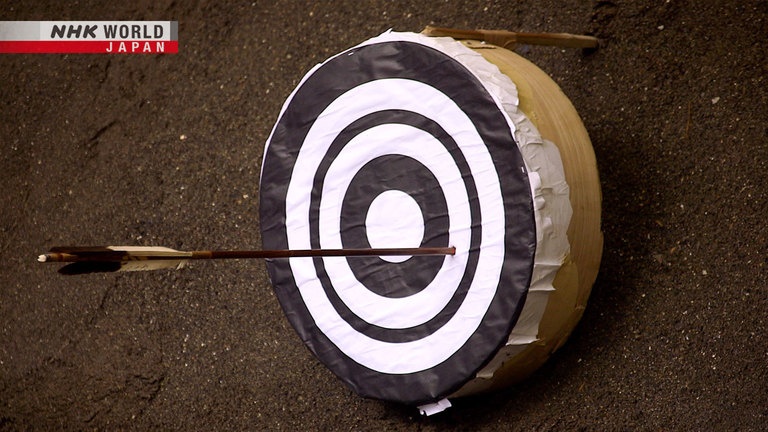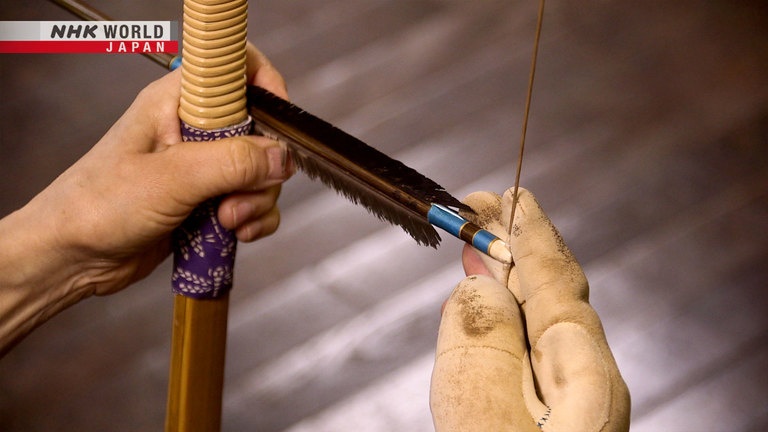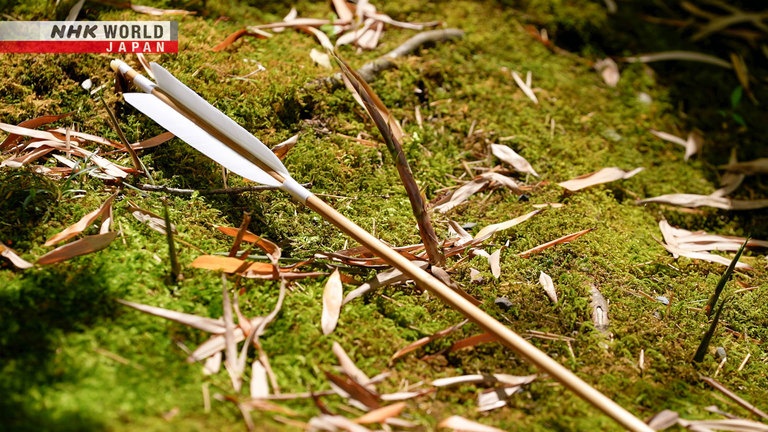Bow and Arrow
The Japanese language is rich in words and expressions influenced by nature, history and culture. This episode introduces words related to yumiya, meaning bow and arrow. Together, they've been used for hunting, fighting and rituals throughout their long history. They're also considered to have deep connections to the Japanese spirit. From his home in Kyoto Prefecture, poet and literary translator Peter MacMillan guides us through unique words inspired by this important tool.




Transcript
"Yukigesho."
"Karakurenai."
The Japanese language is rich in unique expressions that reflect nature and culture.
Magical Japanese.
Today's theme is "yumiya," or bow and arrow.
Together, they've been used for hunting, fighting, and rituals throughout their long history.
Bows and arrows are considered to have deep connections to the Japanese psyche or spirit.
This is reflected in "kyudo," traditional Japanese archery.
Hello, I'm Peter MacMillan.
Who knows what "kyudo" is?
It's like archery, but with a focus on spiritual training.
Such a Japanese sport!
In "kyudo" you release the arrow, or "ya," using the "yumi," or bow.
I'll introduce some common phrases inspired by "yumiya."
"mato o ita."
"Mato" means a target, and "mato o ita" means to hit a target.
The phrase is now used in daily conversation to describe a remark or opinion that is to the point.
I think this product isn't doing well because the design doesn't match our customer's needs.
Thanks for the "mato o ita" - on-point - advice.
We'll try reworking the design.
"mato o ita."
"mato o ita."
"zuboshi."
"Zuboshi" refers to the center of the target.
It has also come to mean something that is exactly on the mark.
You took my snack from the fridge, didn't you?
That's "zuboshi"! - spot-on.
How did you know?
There's chocolate on your lips.
"zuboshi."
"zuboshi."
Look at this part of the arrow.
When you draw on the string, this notch makes sure it hauls.
It's called the "hazu."
As it perfectly fits the string, "hazu" has also come to mean "exactly as planned."
In daily conversation, you often hear people say "sonohazu" which means for sure.
I hope Dad will like my drawing.
You're putting so much time into it.
He'll love it. "Sonohazu"! - for sure.
We can use it in this kind of phrase.
"tehazu o totonoeru."
"Te" means something is done by hand, and "totonoeru" means to arrange.
This phrase is used when someone spends time and effort to arrange something.
I can't wait for our trip next month!
Yes. I'll "tehazu o totonoeru" - make arrangements -
so that it'll be the best holiday ever!
"tehazu o totonoeru."
"tehazu o totonoeru."
Long ago, bows and arrows were used as weapons.
To defeat a vast enemy, it was important to shoot a lot, and shoot fast.
"yatsugibaya."
"Tsugi" means to replenish something so that it continues nonstop.
"Baya" means "quick."
"Yatsugibaya" originally meant "shooting arrows in rapid succession."
Now it is used to describe rapid-fire moves or things that come quickly, one after another.
You look tired.
What happened?
The students asked me questions "yatsugibaya" - nonstop.
It was hard work answering all of them!
"yatsugibaya."
"yatsugibaya."
What's the difference between "kyudo" and archery?
In archery, a bow can have a sight, or even a stabilizer.
However, the bow for "kyudo" is simple.
You must rely on your senses.
The beauty of your movements is also important in "kyudo" including stance,
how an arrow is drawn, even the way you move after release.
You must calm your mind so you can perform the same gesture at any time.
This helps train your emotional strength.
Staying calm no matter what the situation is useful in competitions and in business.
But even if I were trained like this, I wouldn't want to be in the following situation!
"yaomote ni tatsu."
"Omote" means the front, and "tatsu" means to stand.
The phrase literally means "to stand at the frontlines against the enemy's arrows."
Today, it is used to describe someone who is in the position of
taking questions or criticism on behalf of their organisation.
We gave away another point...
Our team's strategy is terrible.
It's always the coach that "yaomote ni tatsu" - bears the brunt of the criticism -
in cases like this.
"yaomote ni tatsu."
"yaomote ni tatsu."
"isshi mukuiru."
"Isshi" means one arrow, and "mukuiru" means to pay back.
"Isshi mukuiru" means to shoot back one arrow towards the enemy.
It is also used to describe a small but significant counterattack.
We lost the game, but scored a goal against the world champions.
That means a lot.
I'm so glad we could "isshi mukuiru" - counterattack.
"isshi mukuiru."
"isshi mukuiru."
Making a counterattack.
This reflects the samurai spirit, not wanting to end the fight in defeat.
As in this phrase, an arrow can mean an attack.
But it can also refer to an unexpected appointment.
"shiraha no ya ga tatsu."
"Shiraha" means "white feathers."
And in this instance, "tatsu" means "to stick."
The phrase directly translates as "a white-feathered arrow is stuck on someone."
It's when a person is chosen or singled out from a group.
The belief was that divine forces were behind the selection,
and this is why the feathers are white, a sacred color.
I heard he was chosen as the new team leader.
But he never really made much of an impression.
Didn't you know he was working so hard
behind the scenes? I'm glad he "shiraha no ya ga tatsu" - was singled out.
"shiraha no ya ga tatsu."
"shiraha no ya ga tatsu."
What did you think?
Bows and arrows are not only weapons.
They are meaningful tools, piercing the heart of Japan.
Was today another difficult one?
You must be prepared!
I will throw Japanese words at you "yatsugibaya" - as fast as a shower of arrows!
See you next time! Bye!